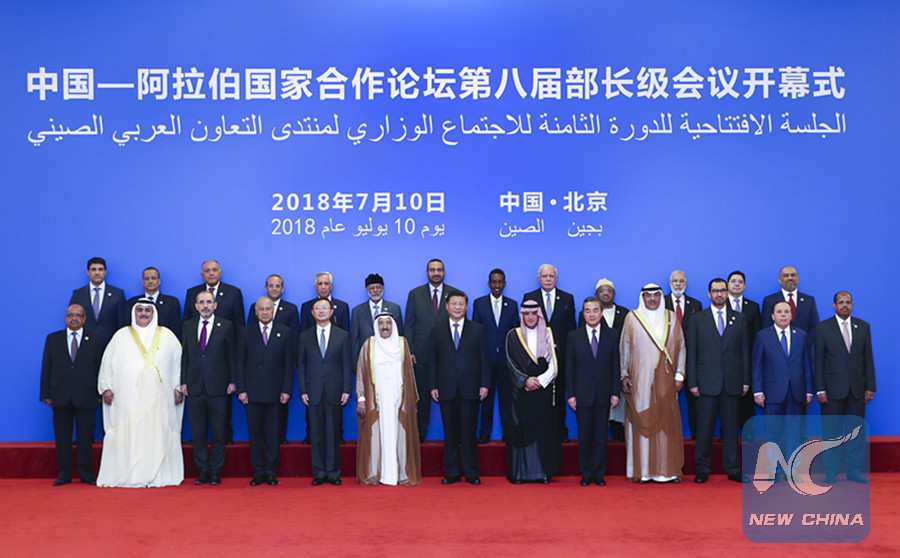
Chinese President Xi Jinping (C, front) poses for group photos with Kuwaiti Emir Sheikh Sabah Al-Ahmad Al-Jaber Al-Sabah (6th L, front) and heads of delegations to the eighth ministerial meeting of the China-Arab States Cooperation Forum in Beijing, capital of China, on July 10, 2018. (Xinhua)
CAIRO, July 12 (Xinhua) -- Arab experts lauded the just-concluded China-Arab cooperation conference for ushering in a new chapter of the China-Arab relations by producing a blueprint for future development of the strategic partnership.
The eighth ministerial conference of the China-Arab States Cooperation Forum (CASCF), held on Tuesday in Beijing, China, approved the Beijing Declaration, a Declaration of Action on Sino-Arab Belt and Road Cooperation, and an action plan guiding the development of the CASCF from 2018 to 2020.
Chinese President Xi Jinping, in a speech at the opening ceremony of the conference, announced that China and the Arab countries had agreed to establish a "future-oriented strategic partnership of comprehensive cooperation and common development."
Calling the Arab states China's natural partners in Belt and Road cooperation, Xi said the cooperation had energized every dimension of China-Arab relations and propelled their all-round cooperation into a new phase.
Indeed, China and the Arab states have increasingly extended their scale of pragmatic cooperation under the Belt and Road Initiative, which was proposed by China in 2013 to build a trade and infrastructure network connecting Asia to Africa and Europe along the ancient trade routes of the Silk Road.
China, now the second largest trading partner of the Arab world with a direct investment stock of 15 billion U.S. dollars, announced a series of concrete measures at the ministerial meeting to promote the mutually beneficial China-Arab cooperation in future.
Arab experts hailed the meeting for producing a clear and systematic blueprint for the future development of the China-Arab ties.
Alanoud Alsabah, a Kuwaiti China expert, said the Beijing Declaration illustrated how the development of China could benefit the Arab countries, as the two sides have agreed to enhance their strategic cooperation.
"The declaration shows China's willingness to support the stability and development of the region under the idea of inclusive reconciliation," Alsabah told Xinhua.
Arab countries could make use of their advantages in the mutually beneficial cooperation under the Belt and Road Initiative, Alsabah said, referring to the rich reserves of oil and gas in Arab states, which need to seek new markets and more investments.
Khalid Dirar, professor of politics in Sudan's al-Rasid Center for Strategic Studies, told Xinhua that the forum is "a step forward for the China-Arab relations."
"With the framework depicted at the forum, the two sides will enhance cooperation and sustain their long-standing and well-established relations," Dirar said.
The action plan, which guides the development of the CASCF from 2018 to 2020, brings forward new plans and projects of cooperation in over 20 fields, including energy, culture, economy and trade.
Nasr Arif, former head of the United Arab Emirates (UAE) Zayed University's Institute for Islamic World Studies, noted that the blueprint in the outcome documents includes more than economic cooperation.
It will facilitate the rejuvenation of the Arab world through comprehensive cooperation between China and Arab states in political, cultural and technical fields, he told Xinhua.
Diaa al-Fiqy, chairman of Egyptian-Chinese Chamber of Commerce, told Xinhua that, taking a long-term view, the outcome documents have charted a clear roadmap for the China-Arab cooperation with the aim to achieve mutual benefits.
Al-Fiqy also called on Arab countries to act accordingly to implement the plans and projects that China proposed to make actual gains in cooperation.
More industrial districts should be jointly established by China and Arab states to elevate the industrial development level of Arab states, many of which are import-dependent, said Algerian economist Faris Masdude.
Mahmoud Raya, editor-in-chief of the Lebanese news website "China in Arab Eyes," told Xinhua that he was encouraged by the outcome documents that propose major projects for deepening the China-Arab cooperation.
"The bilateral ties will be closer and more beneficial," Raya said.

